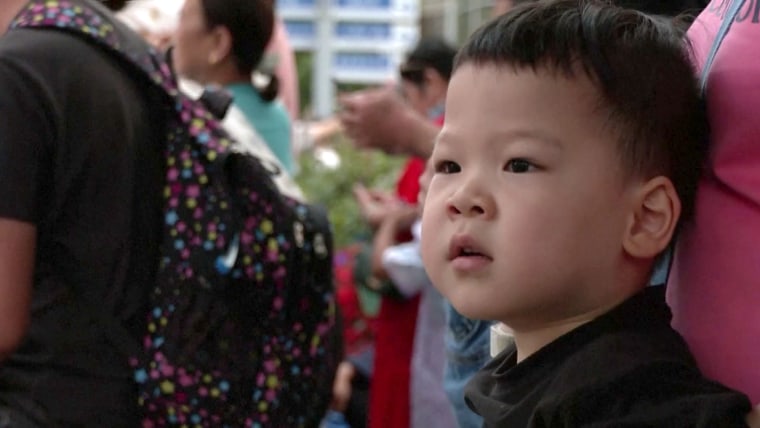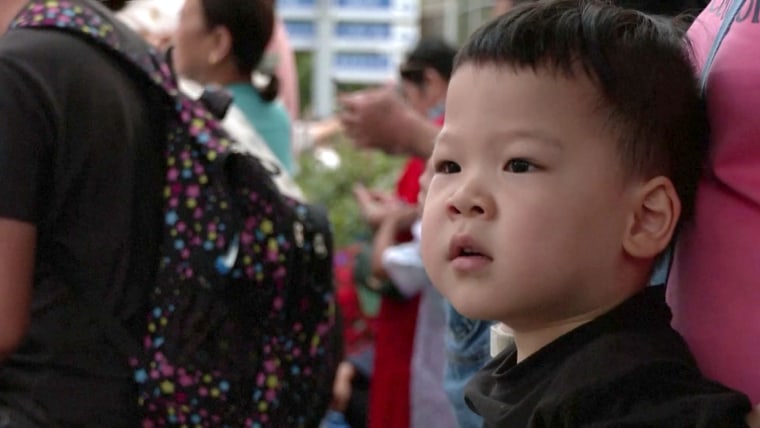HONG KONG — China said Tuesday that its population declined last year for the first time in six decades, a historic shift with profound implications for the world’s second-largest economy.
Officials from the National Bureau of Statistics said mainland China had 1.41175 billion people at the end of 2022, compared with 1.41260 billion a year earlier, a decrease of 850,000. There were a total of 9.56 million births — a record low birth rate of 6.77 per thousand — and 10.41 million deaths.
The announcement was part of a larger release of economic data for 2022, a year when President Xi Jinping’s strict “zero-Covid” policies weighed heavily on growth. Officials reported a 3% increase in gross domestic product, beating expectations but still one of the weakest figures in decades.
The number of births in China has been declining for about a decade, undermining the ruling Communist Party’s consumption-driven growth model and raising questions about whether China can overtake the U.S. as the world’s largest economy. The United Nations has said India will surpass China as the world’s most populous nation later this year.
China’s 9.56 million births are a decrease of almost 10% from 2021, when about 10.6 million babies were born. The death rate of 7.37 per 1,000 people was up from 7.18 in 2021, when China recorded 10.14 million deaths.
As in other countries, declining births means an aging work force for China, which built its economic might largely on a manufacturing sector dependent on cheap labor. Officials said Tuesday that working-age people between 16 and 59 made up 62% of the national population — down from about 70% a decade ago — while people 60 and older accounted for almost 20%.
A major reason for China’s declining population is the rise of the middle class, said Kent Deng, a professor of economic history at the London School of Economics and Political Science.
“Once you have well-qualified, well-educated urban people, they will decide not to produce a lot of kids,” he said, especially given China’s rising cost of living.
Covid has also played a role, although China appears to have experienced the vast majority of its cases and deaths in the last few months. After international criticism that it has not been transparent about the severity of its current outbreak, China said over the weekend it had recorded almost 60,000 Covid-related deaths since early December, when it abruptly ended three years of anti-Covid measures after rare mass protests. Experts say the true death toll could reach 1 million or more in the coming months.
The figures announced Tuesday are the start of what is expected to be a long decline in China’s population, which the U.N. says could reach 800 million by the end of the century. The U.S. population, by contrast, is predicted to grow from its current 337 million, mostly through immigration.
The world’s overall population reached 8 billion in November, according to the U.N.
Although many countries around the world are experiencing population decline, this is the first time China’s population has contracted since 1961, after a three-year famine spurred by then-leader Mao Zedong’s industrialization drive, which is estimated to have killed tens of millions of people.
The country then experienced explosive growth through the second half of the 20th century, its population more than doubling. Concerned that overpopulation could hurt development, Chinese officials introduced a number of reproductive restrictions centered on the “one-child policy,” which was in force from 1980 to 2015.
While the one-child policy was effective in curbing population growth, critics say it resulted in rights abuses and a disproportionate number of men compared with women, especially in the countryside. It also fundamentally changed Chinese ideas about family size, said Deng, as parents realized they could achieve upward social mobility by investing more in educating a single child.
“They can see the result, because they can send their kids to the best schools and then to the best universities,” he said.
Chinese officials have anticipated the demographic crisis, allowing couples to have two children since 2016 and up to three children since 2021. A national policy document issued last year encouraged employers to provide child care and flexible working arrangements and local governments to offer preferential housing and other incentives. Xi promised additional measures to increase the birth rate at a party congress in October.
But the public has largely responded with indifference. A study published last year by the YuWa Population Research Institute, a think tank based in Beijing, found that Chinese people’s desire to have children was among the lowest in the world.
The best way to reverse the trend, Deng said, is to provide family allowances of the kind offered by some governments in Europe.
“You need a lot of resources to persuade the young Chinese that it is actually profitable to have a second child,” he said.
The relative lack of support makes motherhood especially unappealing to young urban women like Beijing resident Nora Yang, who said she is “80%” against having her own children.
“The working environment is really unfriendly to mothers,” said Yang, 24. “Once they have a baby, it’s really hard to make more progress in their career.”
Yang agreed with Deng that the government is not doing enough to change her mind.
If Chinese officials really want to encourage children, they should “give money to those who have more babies,” she said. “Otherwise they’ll fail.”
Source: | This article originally belongs to Nbcnews.com











